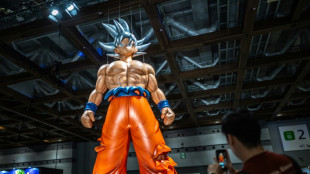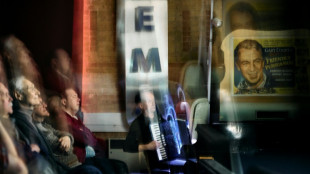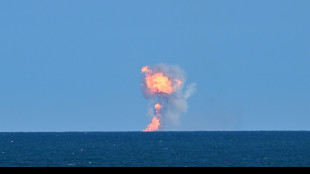-
 Asian markets fluctuate as traders weigh geopolitical tensions
Asian markets fluctuate as traders weigh geopolitical tensions
-
'An inauspicious day': the landmines ruining Myanmar lives

-
 UN to vote again on Gaza ceasefire, US plans unclear
UN to vote again on Gaza ceasefire, US plans unclear
-
Japan's manga powerhouse 'Dragon Ball' turns 40

-
 Japanese, Koreans bottom of global love life survey
Japanese, Koreans bottom of global love life survey
-
Son blames 'mistakes' after South Korea held by Palestine in qualifier

-
 Japan ramps up tech ambitions with $65 bn for AI, chips
Japan ramps up tech ambitions with $65 bn for AI, chips
-
Lights, action, melodrama! Silent films get new reel at London haven

-
 Myanmar led world in landmine victims in 2023: monitor
Myanmar led world in landmine victims in 2023: monitor
-
ICC to sentence Timbuktu war criminal

-
 Ugandan opposition figure Besigye 'kidnapped', says wife
Ugandan opposition figure Besigye 'kidnapped', says wife
-
Australia's Jason Day eyes more major glory after resurgence

-
 Machu Picchu security boosted after visitors spread human ashes
Machu Picchu security boosted after visitors spread human ashes
-
Popovic hails Australia character in 'crazy' World Cup qualifier

-
 Taliban govt clearing 'un-Islamic' books from Afghanistan shelves
Taliban govt clearing 'un-Islamic' books from Afghanistan shelves
-
Argentina beat Peru as Uruguay hold Brazil

-
 Asian markets struggle as traders weigh geopolitical tensions
Asian markets struggle as traders weigh geopolitical tensions
-
Tatum stars as Celtics end Cavaliers unbeaten start

-
 Hurting India under pressure in blockbuster five-Test Australia series
Hurting India under pressure in blockbuster five-Test Australia series
-
'They killed her dream': Israel strike leaves woman footballer in coma

-
 Iraq holds its first census in nearly 40 years
Iraq holds its first census in nearly 40 years
-
Iraqis face tough homecoming a decade after IS rampage

-
 Russian net tightens around last civilians left in eastern Ukraine
Russian net tightens around last civilians left in eastern Ukraine
-
Olympic champion Tebogo aims to inspire next generation of African athletes

-
 Valencia on target as ten-man Ecuador upset Colombia
Valencia on target as ten-man Ecuador upset Colombia
-
'Rust' to premiere three years after on-set shooting

-
 Strike at French cognac maker Hennessy over measures in China spat
Strike at French cognac maker Hennessy over measures in China spat
-
Xi, Lula meet in Brasilia to 'enhance ties'

-
 SpaceX fails to repeat Starship booster catch, as Trump watches on
SpaceX fails to repeat Starship booster catch, as Trump watches on
-
'I have left a legacy': Nadal retires from tennis

-
 US recognizes Venezuela opposition's Gonzalez Urrutia as 'president-elect'
US recognizes Venezuela opposition's Gonzalez Urrutia as 'president-elect'
-
European powers, US seek to censure Iran at UN nuclear watchdog board

-
 UNAIDS chief says husband, Ugandan opposition figure Besigye, 'kidnapped'
UNAIDS chief says husband, Ugandan opposition figure Besigye, 'kidnapped'
-
Nadal's sensational career ends as Netherlands defeat Spain in Davis Cup

-
 US announces talks with Israel over civilian casualties in Gaza
US announces talks with Israel over civilian casualties in Gaza
-
SpaceX fails to repeat Starship booster catch, as Trump looks on

-
 G20 summit ends with Ukraine blame game
G20 summit ends with Ukraine blame game
-
Trump appoints TV celebrity 'Dr. Oz' to key US health post

-
 European stocks fall on Ukraine-Russia fears, US focused on earnings
European stocks fall on Ukraine-Russia fears, US focused on earnings
-
Last-gasp Szoboszlai penalty rescues Hungary draw with Germany

-
 Germany, Netherlands draw as Nations League group stage ends
Germany, Netherlands draw as Nations League group stage ends
-
Hong Kong tycoon Jimmy Lai takes witness stand in collusion trial

-
 Guardiola set to extend stay as Man City boss - reports
Guardiola set to extend stay as Man City boss - reports
-
Minnows Botswana hold Egypt to qualify with Mozambique, Tanzania

-
 Inter Miami coach Martino leaving club for 'personal reasons' - club source
Inter Miami coach Martino leaving club for 'personal reasons' - club source
-
Chinese man sentenced to 20 months for Falun Gong harassment in US

-
 Hong Kong court jails 45 democracy campaigners, drawing condemnation
Hong Kong court jails 45 democracy campaigners, drawing condemnation
-
'I did it for Rafa': Alcaraz after keeping Spain Davis Cup dream alive

-
 Alcaraz keeps Spain and Nadal Davis Cup dream alive
Alcaraz keeps Spain and Nadal Davis Cup dream alive
-
Trump names China hawk Howard Lutnick commerce secretary

Mexico president survives recall vote marked by low turnout
Mexican President Andres Manuel Lopez Obrador on Sunday easily survived a divisive referendum on whether he should step down or complete his term -- a vote marked by low turnout, initial results showed.
With an approval rating of nearly 60 percent, Lopez Obrador's presidency had never appeared seriously at risk, and the left-wing populist was himself one of the vote's biggest cheerleaders.
The 68-year-old president, elected in 2018 for a six-year term, won a majority of around 90.3-91.9 percent in favor of his staying in office until 2024, according to a preliminary vote count by the National Electoral Institute.
The turnout rate was between 17 and 18.2 percent, meaning that even if Lopez Obrador had lost, the result would not have been legally binding.
Supporters of the referendum -- the first of its kind in Mexico -- said it was a way of increasing democratic accountability, giving voters the opportunity to remove the president due to loss of confidence.
"Now we have the chance to change what's not right. There have been presidents who, after being elected by the people, ended up serving other interests," Benigno Gasca, a 57-year-old mathematician and musician, told AFP.
- 'Useless exercise' -
But critics saw it as expensive propaganda and an unnecessary distraction from the many challenges facing the country, including drug-related violence, poverty and the rising cost of living.
"It's a useless exercise -- money thrown away," said Laura Gonzalez, a 62-year-old retired teacher.
Lopez Obrador cast his vote early Sunday with his wife at a polling station near the presidential palace.
"Let no one forget that the people are in charge," he declared afterward.
Mexico's constitution limits presidents to one term, and Lopez Obrador has vowed to retire in 2024, following accusations by opponents that the referendum was a step towards trying to stay in power beyond then.
Mario Delgado, leader of the ruling party Morena, said voters had recognized Lopez Obrador's "dedication to the most needy and the enormous moral authority with which he governs.
"Only an indomitable, unwavering democrat like him can subject himself to a recall process," he added.
But Marko Cortes, of the conservative opposition party PAN, said the vote was marked "by illegality, lies, manipulation and the diversion of public resources."
Alejandro Moreno of the PRI, which ruled Mexico for seven decades until 2000, tweeted that Morena had turned the referendum into a "mockery" to "satisfy its own ego and continue deceiving Mexicans."
- 'Sustenance of democracy' -
Some 93 million voters were eligible to participate in the midterm referendum, which was incorporated into Mexico's constitution in 2019 at Lopez Obrador's initiative.
Most of the signatures that were collected in order for the vote to happen came from his supporters.
Experts had predicted that a win could give impetus to Lopez Obrador's policy agenda, such as controversial energy reforms.
The president also has his eye on the 2024 elections and the prospects for his party and possible successors, including Mexico City Mayor Claudia Sheinbaum.
Lopez Obrador enjoyed an approval rating of 58 percent in March, although that was far below a peak of 81 percent seen in February 2019, according to a poll of polls by the Oraculus firm.
Carmen Sobrino, a 64-year-old housewife, said she heeded the call to vote because she was happy with Lopez Obrador.
"I hope he continues," she said after casting her ballot in the capital.
Another voter, 59-year-old economist Flor Mercedes Rodriguez, saw the referendum as a chance to "resume the culture of citizen participation... It's the sustenance of democracy."
The president accused the National Electoral Institute before the vote of sabotaging the exercise in collusion with his political opponents by failing to do enough to promote it.
A.Anderson--AT
